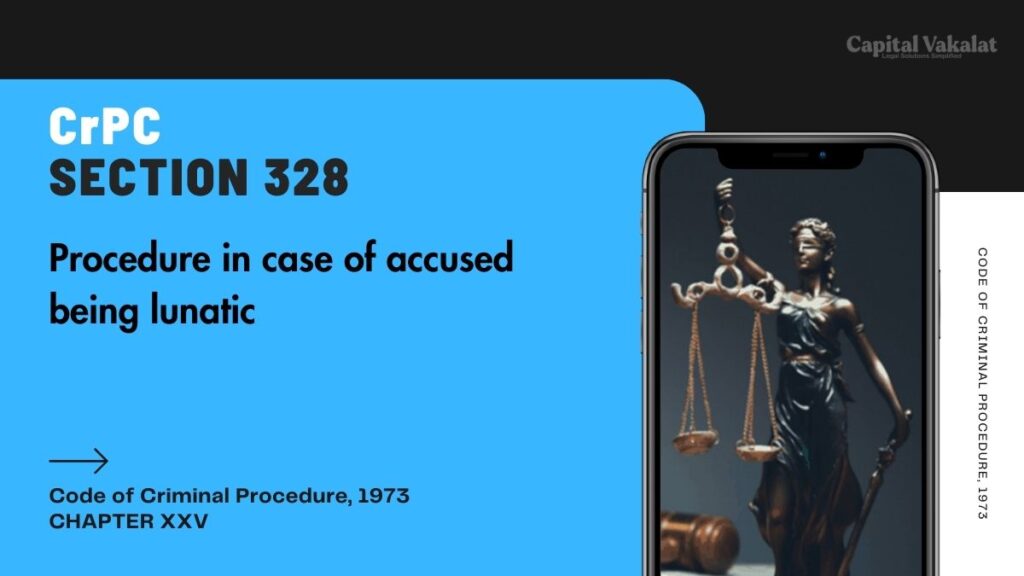In the intricate labyrinth of criminal justice, the intersection of mental health and law presents a particularly sensitive and complex challenge. Fair trials, a cornerstone of justice, must balance legal procedures with the humane treatment of individuals unable to comprehend the nature or consequences of their actions due to mental illness. The Indian legal system, recognizing this delicate balance, provides specific provisions under the Code of Criminal Procedure (CrPC) to address such scenarios.

One such provision is Section 328 CrPC, which delineates the procedure to be followed when an accused person is deemed to be a lunatic.
Bare Act. Section 328 Cr.P.C.
Overview of Section 328 CrPC
Historical Context
To appreciate the relevance of Section 328 CrPC, it is crucial to understand its historical roots. The provision has evolved to integrate modern psychiatric practices and the legal system’s need to ensure that the accused receive a fair trial without compromising their mental health.
Definition of a Lunatic in Legal Terms
Medical vs. Legal Definitions
A lunatic, in legal parlance, refers to an individual who, due to mental illness, is incapable of understanding the nature or consequences of their actions. This definition, however, varies slightly from medical definitions, which may encompass a broader range of mental health issues.
Mental Health and the Law
Integration of Psychiatry and Law
The seamless integration of psychiatry and law is essential for the effective implementation of Section 328 CrPC. This involves close cooperation between medical professionals and the judiciary to ensure accurate assessment and appropriate legal responses.
The Need for Section 328 CrPC
Safeguarding Rights of the Mentally Ill
Section 328 CrPC is designed to protect the rights of mentally ill individuals, ensuring they are not unjustly penalized for actions they cannot comprehend or control. This provision aims to balance legal accountability with compassion and care.
Initiating Proceedings Under Section 328 CrPC
Judicial Discretion
When there is reason to believe that an accused person is of unsound mind, the court has the discretion to initiate proceedings under Section 328 CrPC. This is a crucial first step in ensuring that the accused receives the appropriate legal and medical attention.
Medical Examination of the Accused
Role of Medical Professionals
The medical examination is a pivotal aspect of the procedure, requiring qualified psychiatrists to assess the mental state of the accused. Their expert opinion forms the basis for subsequent legal decisions.
Reporting and Certification of Mental Illness
Documentation and Legal Formalities
The process requires thorough documentation and certification of the accused’s mental condition. This ensures that the court has reliable evidence to base its decisions on, safeguarding the rights of the accused.
Judicial Review and Order
Evaluating Medical Reports
The court reviews the medical reports to determine the next steps. This may include ordering further treatment or care, ensuring that the accused’s mental health needs are addressed while maintaining legal integrity.
Custody and Care of the Accused
Humane Treatment
The provision mandates humane treatment of the accused, with a focus on rehabilitation rather than punishment. This reflects a progressive approach to criminal justice, prioritizing the well-being of mentally ill individuals.
Delay in Proceedings
Impact on Accused and Legal Process
Delays in proceedings can significantly affect the accused, exacerbating their mental health issues. The legal system must strive to expedite cases involving mentally ill individuals to prevent undue suffering.
Intersection with Other Legal Provisions
Relevant Sections of CrPC and IPC
Section 328 CrPC intersects with other legal provisions, such as those in the Indian Penal Code (IPC) and other sections of the CrPC. Understanding these intersections is vital for comprehensive legal practice.
Rights of the Accused
Ensuring Fair Treatment
The rights of the accused under Section 328 CrPC are paramount. These rights ensure that mentally ill individuals are not deprived of their liberty without due process and are provided with the care they need.
Role of Family and Guardians
Support Systems for the Accused
Family and guardians play a crucial role in supporting the accused through the legal and medical process. Their involvement can significantly impact the rehabilitation and reintegration of the individual.
Case Studies
Landmark Judgments
Examining landmark judgments helps illustrate the practical application of Section 328 CrPC. These cases provide insights into how the law has been interpreted and enforced over time.
Rehabilitation and Reintegration
Post-Trial Support
Rehabilitation and reintegration are key components of the process, ensuring that the accused can lead a normal life post-trial. This involves ongoing support and monitoring.
Challenges in Implementation
Practical Difficulties
Implementing Section 328 CrPC presents several challenges, including resource constraints and varying levels of awareness among stakeholders. Addressing these challenges is crucial for the provision’s success.
Legal Reforms and Recommendations
Enhancing the Procedure
Continuous legal reforms are necessary to enhance the effectiveness of Section 328 CrPC. Recommendations from legal experts and mental health professionals can guide these reforms.
Public Awareness and Education
Reducing Stigma
Raising public awareness about mental health and the legal protections available under Section 328 CrPC can help reduce stigma and promote a more inclusive society.
Conclusion
Summary of Key Points
In conclusion, Section 328 CrPC plays a vital role in ensuring that individuals with mental illness receive fair treatment within the criminal justice system. By balancing legal accountability with compassionate care, this provision reflects the evolving understanding of mental health and its implications for justice.